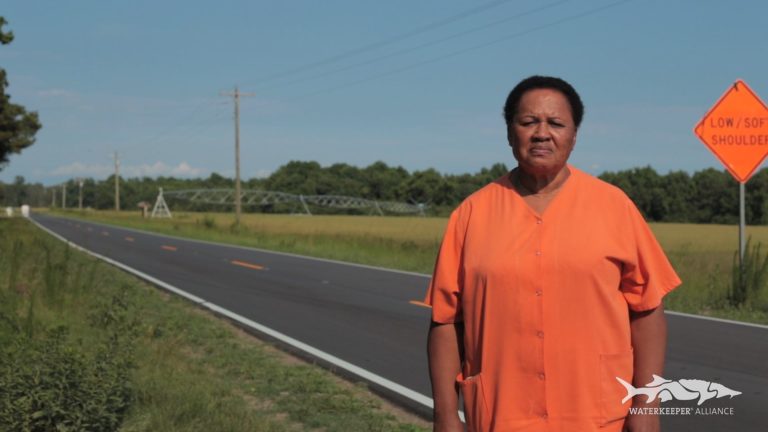
Written by Will Hendrick, staff attorney for Waterkeeper Alliance, and Kemp Burdette, Cape Fear Riverkeeper. This piece originally appeared in the July 7th edition of the Fayetteville Observer.
Last month, the North Carolina General Assembly again voted to prioritize polluters over people when it overrode Governor Cooper’s veto and enacted the NC Farm Act, SB711. In the House of Representatives, the vote was incredibly close; advocates for healthy communities, clean water and clean air came up just three votes short of stopping a veto override. The passage of this legislation serves as a reminder of the importance of electing representatives who care more about communities than campaign contributions and, as we approach election season, how we got to a place where our legislators consistently protect corporate profits instead of citizens.
In 2013, hundreds of North Carolinians seeking to protect their property and health from hog waste sprayed onto them by neighboring swine production facilities filed a lawsuit in federal court. They alleged that waste mismanagement created a private nuisance that entitled them to legal relief. These North Carolinians sought compensation for the harmful actions of their neighbors. But they didn’t sue their neighbors; they sued an entity — Smithfield Foods — with the means to invest in the superior technology necessary to manage swine waste. They were asserting property rights that predated North Carolina’s statehood. But the General Assembly tried to stop them at every turn in their pursuit of justice.
Just weeks after plaintiffs filed suit, the General Assembly changed the longstanding “Right to Farm” law, enacted in 1979, by limiting remedies available to victims of nuisance caused by agricultural operations and vastly extending protections for such operations. This law prevented neighbors from suing operations even when these changes gave rise to a nuisance that didn’t previously exist. The plaintiffs persisted.
Though facing a well-heeled corporate defendant and its army of lawyers, plaintiffs prevailed in the early stages of litigation and survived a motion to dismiss. Instead of acknowledging the merit of their lawsuits, the General Assembly once again changed the rules of the game to the advantage of industrial agriculture. Last year, legislators passed a law limiting the financial damages that victims could be awarded in future cases. Governor Cooper vetoed this legislation, noting that “nuisance laws can be used to protect property rights and make changes for good” and “[s]pecial protection for one industry opens the door to weakening our nuisance laws.” The General Assembly overrode that veto, but it wasn’t yet done stripping rights from citizens.
In April 2018, ten North Carolinians won a $50 million judgment against a subsidiary of Smithfield Foods after a jury decided the corporation had caused harm and needed to be punished because it had “committed egregiously wrongful acts.” Under state law that limits punitive damages, a judge reduced the judgment to $3.25 million. But that reduction didn’t satisfy the legislature, which sought to further reduce remedies for nuisance and limit the situations in which neighbors of agriculture operations could seek redemption.
Under SB711, it’s difficult to see how any injured neighbor could sue an operation to end a nuisance or recover damages for real and lasting injuries like water contamination and health problems. Despite evidence of adverse impacts miles from an industrial swine operation, the law deprives victims of a remedy if they live more than one-half mile from a facility. In practice, this would create a “sacrifice zone” around industrial agricultural operations in which homeowners wouldn’t be able to protect their family’s health or the use and enjoyment of their property. SB711 also eliminates a longstanding exception to the Right to Farm that applied when the farmer behaved negligently. Finally — in direct response to the award of damages against Smithfield — the law makes punitive damages in these types of cases contingent on prior prosecution by the Department of Environmental Quality. Notably, the legislature has consistently slashed funding for that very agency on whose action future damages now depend.
Governor Cooper, to his credit, again objected to this attack on property rights and environmental protection. He observed, when vetoing SB711, “Our laws must balance the needs of businesses versus property rights. Giving one industry special treatment at the expense of its neighbors is unfair.” Unfortunately, too many elected to the General Assembly disagreed, as they once again acted to strip legal rights from North Carolinians.
It’s time to rise up against these legislative efforts to decrease protections for communities and the environment. Our elected officials need to stand with affected community members and take immediate action to protect North Carolinians from corporate interests.